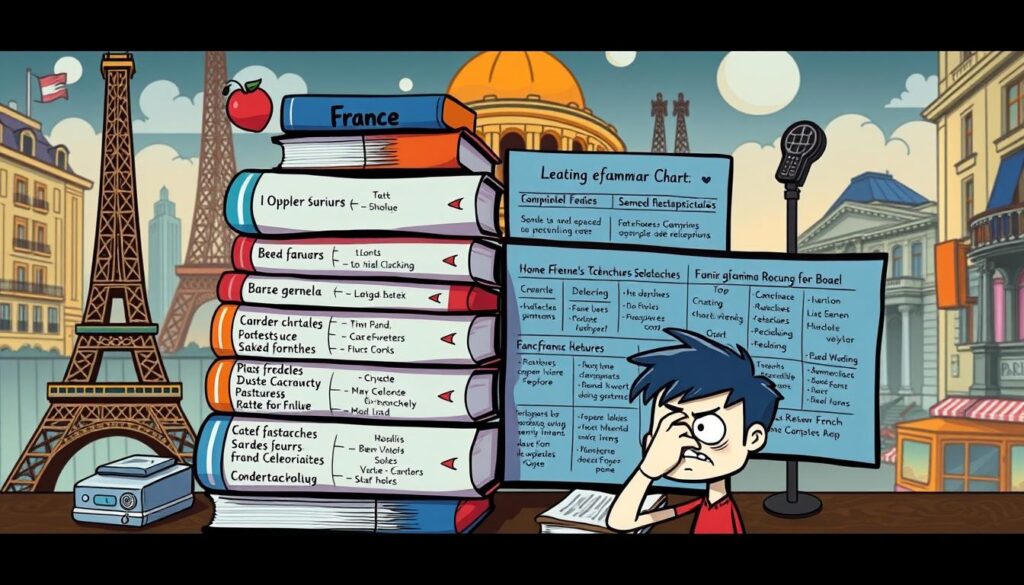Starting your French language journey requires a solid french vocabulary base. Using objects and places around you is a smart way to learn, as many education experts suggest. Websites like italki offer many French lessons, covering vocabulary enhancement, how to use verbs, and how to pronounce words.
Stuart Webb, a linguistics professor at the University of Western Ontario, says focusing on the 800 to 1000 most common words is key. These words form the core of your learning. They help you grasp french language variations and diverse French terminology.
On italki, professional French tutors offer customized lessons that boost your confidence and speaking skills. Starting with words for your home and everyday items builds a firm foundation. Then, you can dive deeper into the language, exploring unique french phrases and understanding the language differences.

Understanding the Basics: Common French Words
Learning French means understanding a variety of expressions and vocabulary. It’s important to use nouns, pronouns, and adjectives often. They help you talk about everyday life clearly.
Common Nouns
French has many common nouns for people, places, and things. Knowing these words is key to building your vocabulary. For example, “ami” means friend, “maison” means house, and “chien” means dog.
- L’ami: The friend
- La maison: The house
- Le chien: The dog
Popular Pronouns
Pronouns make sentences flow better, leading to more natural conversations. It’s important to learn pronouns like “je” (I), “tu” (you), “il” (he), and “elle” (she).
- Je: I
- Tu: You (singular informal)
- Il: He
- Elle: She
Basic Adjectives
Adjectives help us describe things in more detail. Learning words like “petit” (small), “grand” (big), “beau” (beautiful), and “vieux” (old) is very useful.
- Petit: Small
- Grand: Big
- Beau: Beautiful
- Vieux: Old
Experts say to start with the most common words first. You need about 500 to 1,000 words for simple conversations. To reach a B2 level, you’ll need 4,000 to 5,000 words. Practice every day with apps, media, and speaking will help you get there.
Different French Words for Household Items
To really get good at French, learn the words for household items. Knowing how to talk about different rooms in a French house helps a lot in everyday talk. This part talks all about rooms and what you’ll find in a French home.
Rooms in the House
Learning the French names for rooms in a house is fun and useful. You’ll learn terms like “La Maison en Général” (The House in General) for big categories. You’ll also learn specific names for each room:
- Le Salon – Living Room
- La Cuisine – Kitchen
- La Salle à Manger – Dining Room
- La Chambre – Bedroom
- La Salle de Bains – Bathroom
- Le Bureau – Office
- La Blanchisserie – Laundry Room
- Le Sous-sol – Basement
Knowing these basic terms makes it easier to get around a French-speaking home.
Common Household Objects
Knowing the French words for household items helps you make useful sentences. Here are some important ones to remember:
| Object in French | Translation |
|---|---|
| Le réfrigérateur | Refrigerator |
| Le canapé | Couch |
| La télévision | Television |
| Le lit | Bed |
| L’armoire | Wardrobe |
| La douche | Shower |
| Le miroir | Mirror |
For example, saying “Je suis dans la cuisine” (I am in the kitchen) shows how to use these words in real life. It makes your French better.
Food and Drink Vocabulary in French
Starting your journey into French food and drink words takes you deep into France’s culture. You will learn terms to easily order food or talk about your food likes. For example, if you want to say “I drink coffee” or “I eat salad” in French, you’d say “Je bois du café” or “Je mange de la salade.” This helps turn what you know into what you can use.
Common Food Items
French food has a wide variety of items, so knowing the right words is key. It’s important to know specific terms to communicate clearly. For example, the French say “5 fruits et légumes par jour” meaning “5 fruits and vegetables a day.” Popular fruits include “la cerise” (cherry), “le citron vert” (lime), and “la fraise” (strawberry).
Important vegetables are “le petit pois” (peas) and “l’épinard” (spinach). In France, there are special shops like “la boucherie” for meats like sausages, hams, and pâté. Meats such as “la côte de porc” (pork chop) and “le steak de côte” (rib steak) are favored. Shops also have sections for organic “bio” products. With over 1,200 cheese types, knowing the word “fromage” is crucial.
Popular Beverages
Learning about French drinks goes hand in hand with food. There are many words for beverages. In cafes, you find “café” (coffee) in varieties like “café au lait” and “espresso.” There’s also “eau minérale” and “eau gazeuse” (mineral waters). Alcohol terms you should know include “vin” (wine), along with “vin rouge” (red wine), “vin blanc” (white wine), and “vin rosé” (rosé wine).
Other drinks the French love are “cidre” (cider), “thé” (tea), and “chocolat chaud” (hot chocolate). Knowing these terms helps you confidently go through French menus. Whether you’re eating at a casual “bistrot” or a fancy restaurant, you’ll enjoy your meal more.
French Vocabulary for School and Work
Learning French words for school and work helps with better communication. This guide covers the must-know vocabulary for these environments.
School-Related Terms
Knowing French school terms makes studying there easier. Let’s look at some important words:
Une école means school, un collège is middle school, and un lycée is high school. Words like un étudiant (student) and un professeur (teacher) are common. In class, items such as l’encre (ink), le papier (paper), and les ciseaux (scissors) are used. Students carry these in une trousse (pencil case) and un cartable (school bag).
Teachers are called differently based on the school level. For example, maître/maîtresse in elementary school and professeur in high school. Knowing actions like étudier (to study), écrire (to write), and enseigner (to teach) is important. Phrases such as réussir à un examen (to pass an exam) are also useful.
Career-Related Words
Understanding French words for different jobs helps professionally. Here are key terms:
Knowing words like un métier (occupation) and le bureau (office) is vital. For some professions, we use terms such as:
- un avocat (lawyer)
- un médecin (doctor)
- un ingénieur (engineer)
- un développeur (developer)
Learning words like le travail en équipe (teamwork) and la réunion (meeting) helps in work settings. Being familiar with these will improve your ability to communicate in French at work.
Explore Various French Vocabulary Themes
The French language has a rich array of themes. This includes vocabulary from nature to professions and daily activities. Each aspect of life is covered with beautiful words. Learning these can boost your conversations and cultural insights.
A fun topic to dive into is time-related vocabulary, covering days to seasons like “automne” (autumn). Use sticky notes or partner up for practice. Try using tools like French Kwiziq for better retention.
Below is a table filled with French vocabulary themes. It’s perfect for diversifying your chats:
| Theme | Examples |
|---|---|
| Common Verbs | aimer (to love), être (to be), avoir (to have) |
| Adjectives | grand (big), petit (small), heureux (happy) |
| Questions for Conversations | Comment ça va? (How are you?), Quel âge avez-vous? (How old are you?) |
| Compliments | Tu es magnifique! (You are wonderful!), J’adore ton sourire (I love your smile) |
| Nationalities | français (French), américain (American), chinois (Chinese) |
| Seasons & Holidays | hiver (winter), vacances (holidays), été (summer) |
| Days | lundi (Monday), mardi (Tuesday), mercredi (Wednesday) |
| Continents & Territories | Europe, Afrique, Asie |
| Common Phrases | Je suis désolé (I am sorry), Merci beaucoup (Thank you very much) |
Exploring French themes enhances communication skills. Babbel offers expert-designed content. Their steps introduce new words for real-life use. Also, Quizlet’s flashcards can improve memory, making learning fun and effective.
Tips to Effectively Learn and Remember Different French Words
Learning French means mastering smart study methods and memorization strategies. The French language has about 135,000 words. Setting small goals can make learning these words easier. Aim to learn 10 new words every day. This approach means you could learn about 70 words a week and 300 a month.
Studying for short periods, like 15 to 20 minutes a day, works better than long hours at once. Use tools like flashcards for effective learning. Flashcards give a clear and repeated look at words, unlike long lists. Apps like Memrise, Anki, and Brainscape are great for this. They have special collections, including Memrise’s list of the 5000 most common French words.
Say words out loud to remember them better and improve your pronunciation. Listen to French on Netflix, YouTube, podcasts, and audiobooks for more practice. Testing yourself often and mixing up the words ensures you really know them. You may need to encounter words up to 20 times to really remember them.
Finally, using new words in real conversations is key. Talk with native speakers to practice. This not only shows where you need to improve but also makes the memory stronger. With these learning tips and regular practice, you’ll get better at remembering French words and improve your ability to learn the language.


